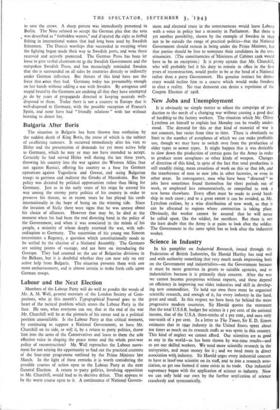Science in Industry
In his pamphlet on Industrial Research, issued through the Federation of British Industries, Sir Harold Hartley has said well and with authority something that very much needs impress-mg both
on the Government and industrialists—on the Government because it must be more generous in grants to suitable agencies, and to industrialists because it is primarily their concern. After the war we cannot become prosperous without exports, and these depend on efficiency in improving our older, industries and skill in develop-
ing new commodities. To hold our own there must be organised scientific research, and enough of it, for every industry in the land, great and small. In this respect we have been far behind the more progressive modern countries. Sir Harold quotes the statement that the total U.S.S.R. budget for science is i per cent. of the national income, that of the U.S.A. three-tenths of i per cent., and ours only one-tenth of r per cent. ID a letter to The Times,. Sir E. D. Simon estimates that in 1940 industry in the United States spent about ten times as much on its research staffs as was spent in this country. This kind of neglect we cannot afford. Our scientists are as good as any in the world—as has been shown by war-time results—and so are our skilled .workers. We need more scientific research in the univfrsities, and more money for it ; and we heed more in direct association with industry. Sir Harold urges every industrial concern to have at least one scientist on its staff, and to join a research asso- ciation, or get one formed if none exists in its trade. Our industrial supremacy began with the application of science to industry. Now we can only hold our own by the further application of science ceaselessly and systematically.


























 Previous page
Previous page